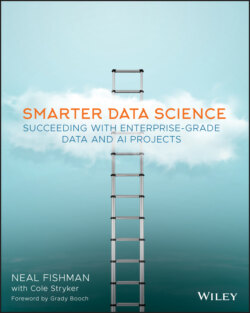Читать книгу Smarter Data Science - Cole Stryker - Страница 47
Summary
ОглавлениеThis chapter covered some of the organizational factors that help drive the need to establish an information architecture for AI. More broadly, an information architecture is also relevant for maximizing the benefit of all forms of analytics. The mind-set to think holistically was covered through the introduction of the six interrogatives of the English language—what, how, where, who, when, and why—over the time horizon of the past, present, and future.
Through democratizing data and data science, an organization can elevate the impact of AI to where it can more unilaterally benefit the organization and its culture. Democratizing data and data science must be placed squarely in the context of each person's role and responsibility and would therefore require sufficient oversight to attain organizational objectives.
While an information architecture can provide for efficiencies and flexibility, if the data is tied too closely to volatile business concepts, the effect can be too binding and stifle the rate of change that IT wants to deliver to the business.
Holistic thinking, democratization, AI, the use of an information architecture, etc., can all serve as a means for an organization to cut down on the time it needs to react. While organizations can plan for the changes they want to create, external factors and influences can hasten the time an organization has to respond. The better equipped an organization becomes with handling data and AI, the less reliance you'll need for responding with a gut feel to a situation.
In understanding that different organizational roles and responsibilities require different lenses by which to undertake a particular business problem, due diligence would require intended responses to be sufficiently questioned.
In the next chapter, we'll further explore aspects on framing concepts for preparing to work with data and AI.
